Unit5 Do you have a soccer ball 单元课件(共125张PPT)+内嵌音视频
文档属性
| 名称 | Unit5 Do you have a soccer ball 单元课件(共125张PPT)+内嵌音视频 |
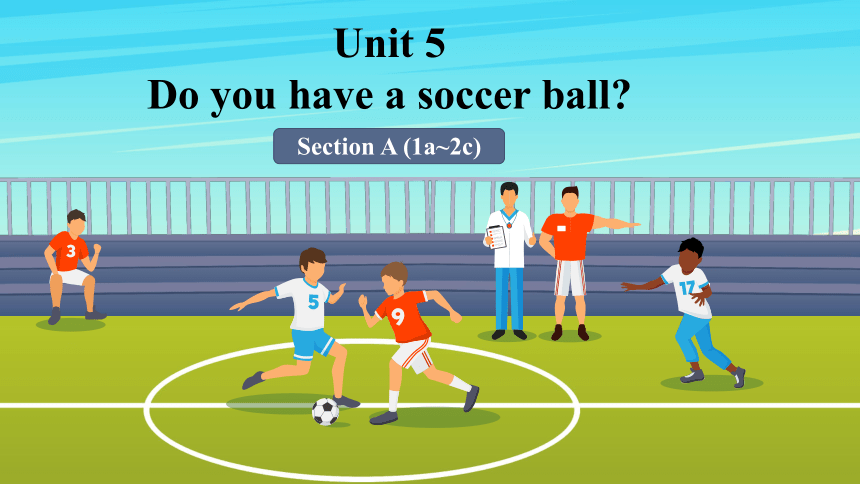
|
|
| 格式 | pptx | ||
| 文件大小 | 96.2MB | ||
| 资源类型 | 教案 | ||
| 版本资源 | 人教新目标(Go for it)版 | ||
| 科目 | 英语 | ||
| 更新时间 | 2024-01-07 20:52:15 | ||
图片预览

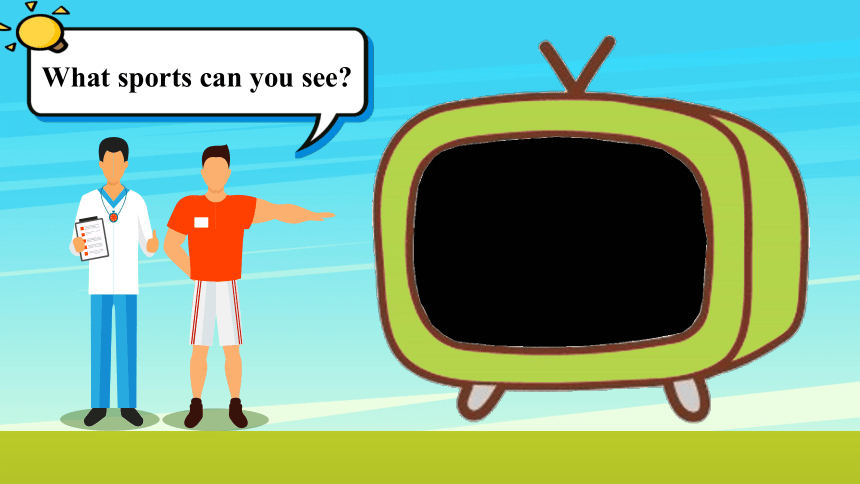
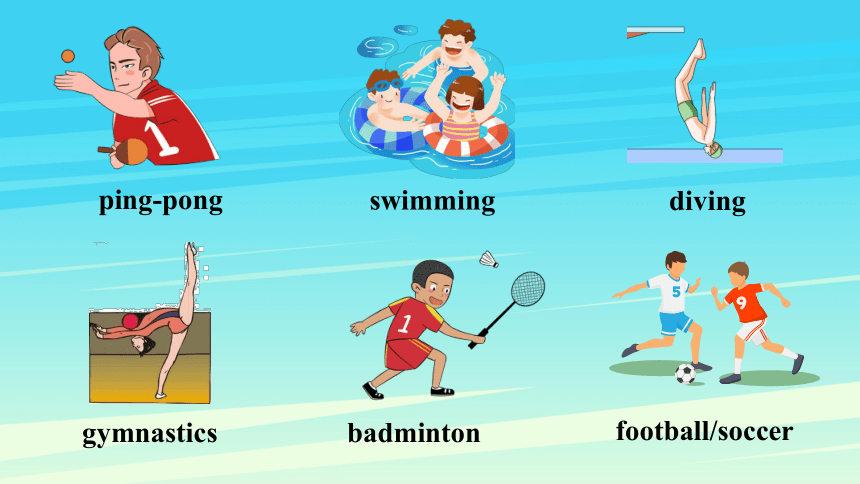
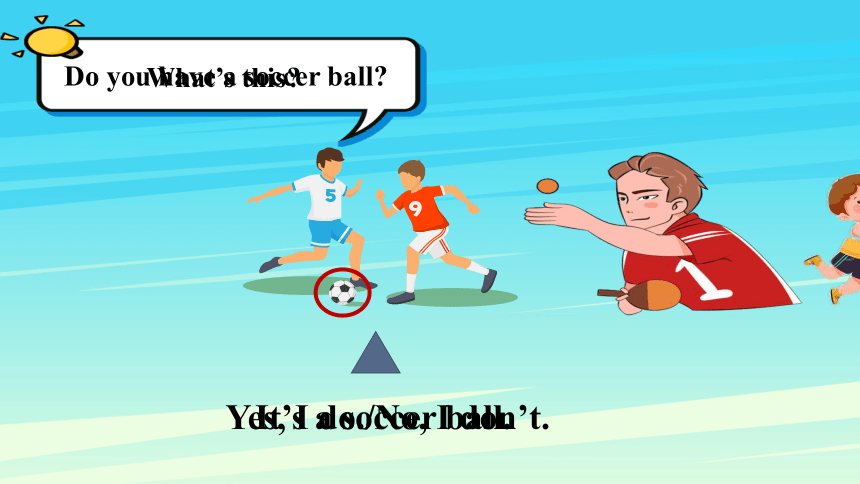
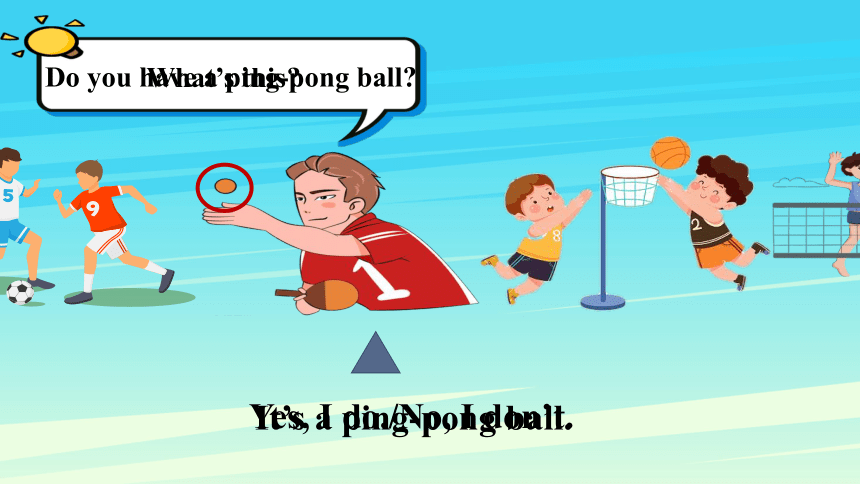
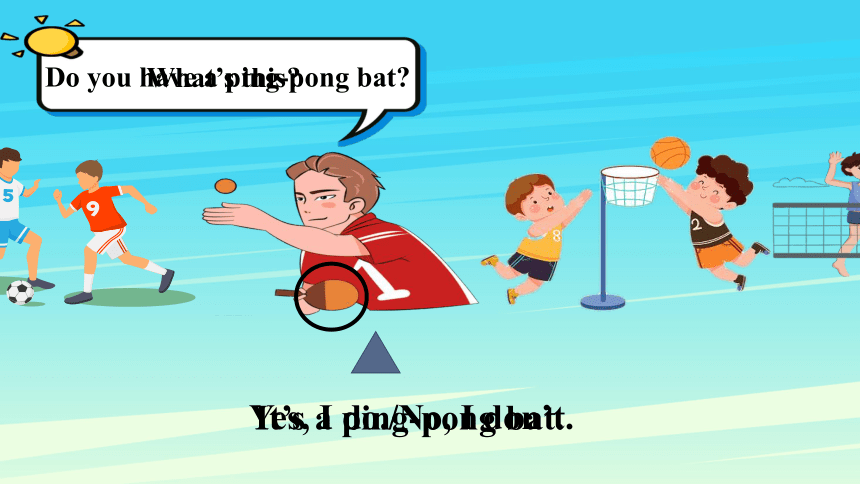
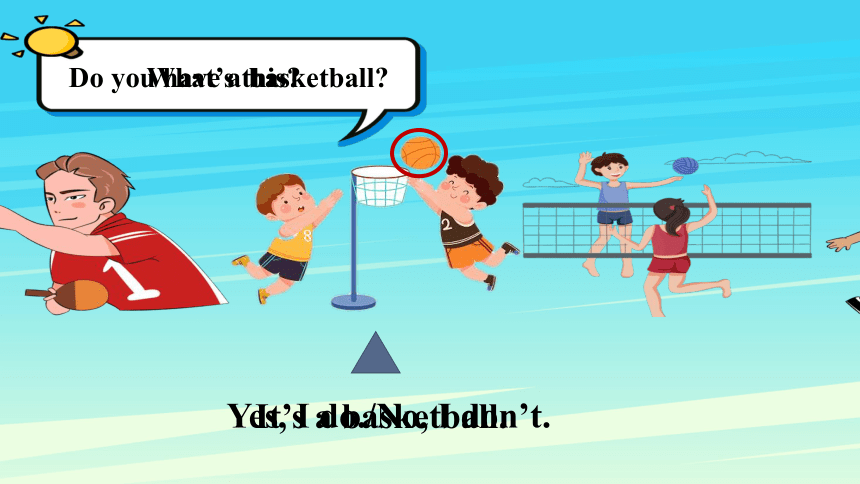
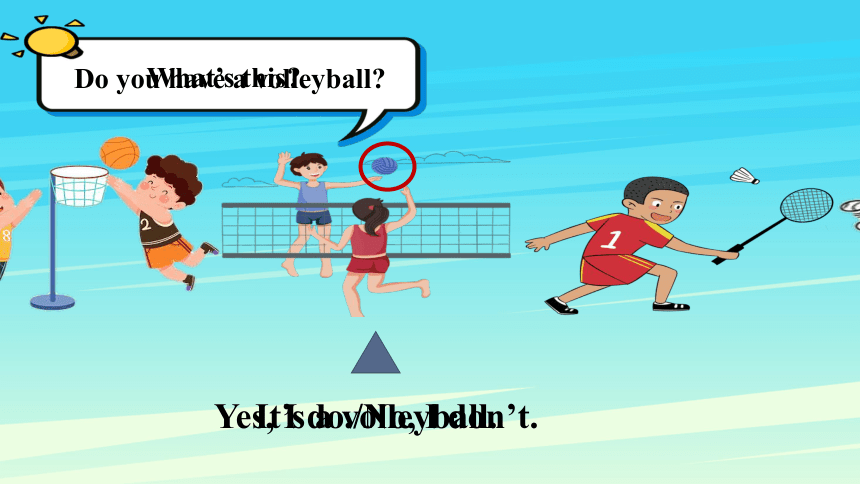
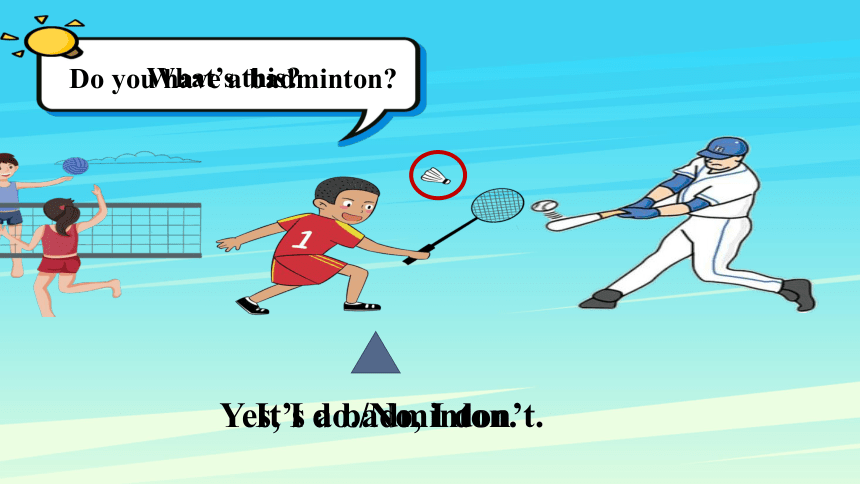
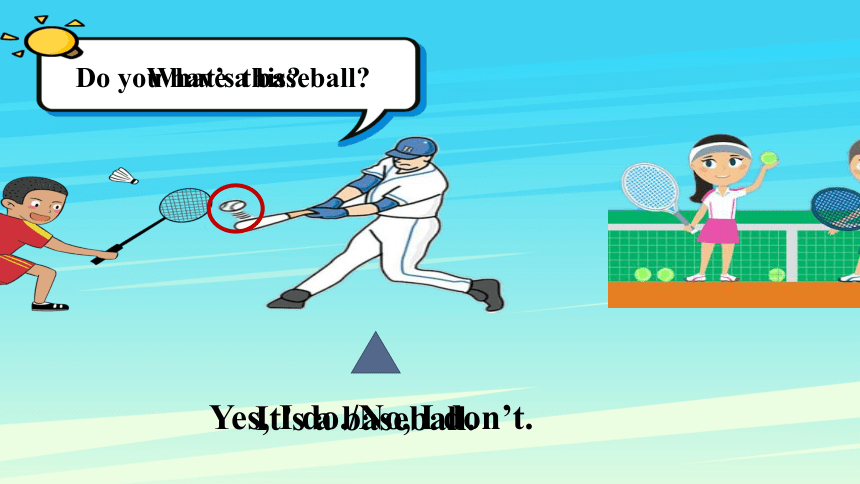

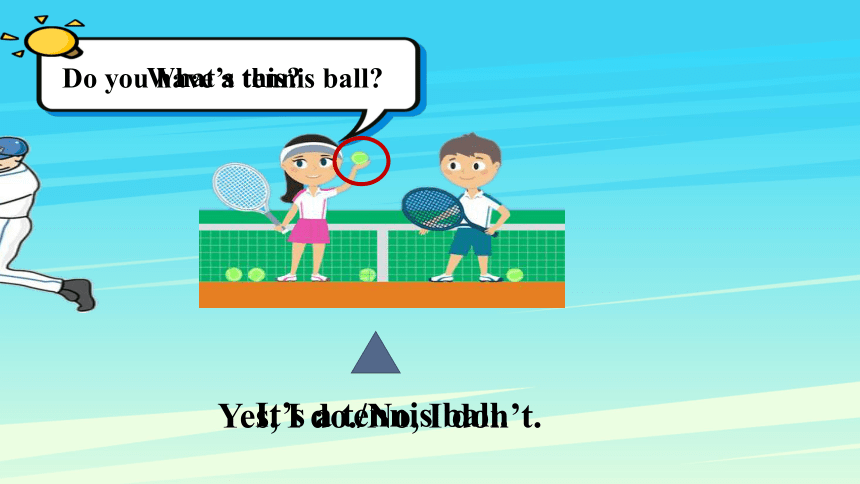
文档简介
(共125张PPT)
Unit 5
Do you have a soccer ball
Section A (1a~2c)
What sports can you see
ping-pong
swimming
diving
gymnastics
badminton
football/soccer
What’s this
It’s a soccer ball.
Do you have a soccer ball
Yes, I do./No, I don’t.
What’s this
It’s a ping-pong ball.
Do you have a ping-pong ball
Yes, I do./No, I don’t.
What’s this
It’s a ping-pong bat.
Do you have a ping-pong bat
Yes, I do./No, I don’t.
What’s this
It’s a basketball.
Do you have a basketball
Yes, I do./No, I don’t.
What’s this
It’s a volleyball.
Do you have a volleyball
Yes, I do./No, I don’t.
What’s this
It’s a badminton.
Do you have a badminton
Yes, I do./No, I don’t.
What’s this
It’s a baseball.
Do you have a baseball
Yes, I do./No, I don’t.
What’s this
It’s a baseball bat.
Do you have a baseball bat
Yes, I do./No, I don’t.
What’s this
It’s a tennis ball.
Do you have a tennis ball
Yes, I do./No, I don’t.
baseball
baseball bat
ping-pong ball
ping-pong bats
Football/soccer ball
volleyball
basketball
[ be s b l]
[b t]
['p p ]
[ s k ]
[ v l b l]
[ bɑ sk t b l]
1a
Match the words with the things in the picture.
1. tennis ball ____
2. ping-pong bat ____
3. soccer ball ____
4. volleyball ____
5. basketball ____
6. baseball bat ____
a
b
f
e
d
c
a
b
c
d
e
f
Try to make sentences with the given pictures.
I have a ping-pong bat and 2 ping-pong balls.
Try to make sentences with the given pictures.
I have a soccer ball and 2 basketballs.
Try to make sentences with the given pictures.
Bob has a basketball and Cindy has a volleyball.
Bob
Cindy
Try to make sentences with the given pictures.
She has a soccer ball, a baseball and 3 baseball bats.
当and连接三个或三个以上的名词时,and放在最后两个名词短语中间
1b
Listen and circle the words you hear.
a
b
c
d
e
f
ping-pong bat soccer ball volleyball ping-pong ball
1b
Listen and fill in the blanks.
a
b
c
d
e
f
A: Do you have
B: Yes, I do.
A: Do you have
B: .
a ping-pong bat
a ping-pong ball
No, I don't
Language points
1. Do you have a ping-pong bat
行为动词have的一般现在时的一般疑问句,
其构成为: Do/ Does + 主语+ have + 宾语?
含有be动词的陈述句将be提前变成一般疑问句,若句子中的动词的行为动词则借助助动词构成一般疑问句,把助动词提前。
Language points
1. Do you have a ping-pong bat
Do aux. v. & v. 用于构成否定句和疑问句; 做; 干
1) do在此处是助动词,没有实际意义,主要用于构成行为动词的疑问句或否定句。第三人称单数形式为does。
Do you go to school at 7:30
你七点半去上学吗?
Language points
1. Do you have a ping-pong bat
Do aux. v. & v. 用于构成否定句和疑问句; 做; 干
2) do还可作行为动词, 意为“做”。
I do my homework after dinner.
晚饭后我做家庭作业。
Language points
1. Do you have a ping-pong bat
have作及物动词,意为“有”,其第三人称单数形式是has。
I have a red bike. She has a blue one.
我有一辆红色自行车。她有一辆蓝色自行车。
There is a bike in the yard.
院子里有一辆自行车。
易混辨析: have 与 there be
have 表示“拥有”,强调所属关系
there be 强调存在关系
1c
Practice the conversation with your partner. Then ask and answer questions about the things in the picture.
a
b
c
d
e
f
A: Do you have
B: Yes, I do.
A: Do you have
B: No, I don't
2a
Look at the pictures and observe.
What’s the girl’s name in the middle
What’s the boy’s name on the right
What’s the boy’s name on the right
What’s the boy’s name on the right
2a
Listen to the conversations and number the pictures [1-4].
1
3
4
2
2b
Listen again. Match the pictures in 2a with the balls.
3
2
4
3
1
4
2
2b
Listen again and complete the conversations.
Bob: Do you have a___________, Paul
Paul: No, I don’t.
Bob: Does your brother Alan have one
Paul: _____________
John: Hi, Mike.
Mike: Hi, John.
John: I want to ______________.
Do you __________________
Mike: Yes, I do.
John: Great!
soccer ball
Yes, he does.
play basketball
have a basketball
2b
Listen again and complete the conversations.
Jane: Hi, Sally.
Sally: Hi, Jane.
Jane: Sally, this is _________, Anna.
Sally: Hi, Anna. Nice to meet you.
Anna: ________________, Sally.
Sally: Let’s ___________.
Do you have a __________, Jane
Jane: Sorry, I don’t.
Frank: Do you _____________, Dale
Dale: No, I don’t.
But my brother does.
Let’s _____________.
my friend
Nice to meet you!
play tennis
tennis ball
have a volleyball
go and find him
=has a volleyball
2c
Ask and answer questions about the people in 2a.
Jane a tennis ball
Does
have
No, .
she doesn’t
2c
Ask and answer questions about the people in 2a.
Dale a volleyball
Does
have
No, .
he doesn’t
2c
Ask and answer questions about the people in 2a.
Paul a soccer ball
Does
have
No, .
he doesn’t
2c
Ask and answer questions about the people in 2a.
Mike a basketball
Does
have
No, .
he doesn’t
A: Do you have …
B: Yes, I do./ No I don’t.
A: Does he/she have…
B: Yes, he/she does.
No, he/she doesn’t.
One student perform the action of these sports.
Other students have a guess what sport it is and make conversations with it.
Thanks for your attention!
Unit 5
Do you have a soccer ball
Section A (2d~Grammar Focus)
What sports are they talking about
Do you have a baseball
Yes, I do.
Does she have a baseball bat
Yes, she does.
Does he have a mask
No, he doesn’t.
Do they have gloves
Yes, they do.
2d. Look at the picture and guess what they are talking about.
A picture of a boy playing baseball
baseball hat
baseball uniform
Maybe they are talking about baseball.
2d. Read the passage and guess who are they.
Helen
Cindy
Are they talking about baseball
They’re making sure they take everything.
2d. Read again and circle the things they mentioned.
Cindy: Hey, Helen, let’s go! We’re late.
Helen: OK.
Cindy: Do you have the baseball
Helen: Yes, I do. It’s in my bag.
Cindy: And where’s our baseball bat
Helen: Bill has it.
Cindy: Oh, yeah. And do you have your jacket
Helen: Oh, no, I don’t. It’s on the chair. Let me get it.
Cindy: And your hat, too!
Helen: OK, I have my jacket and hat. Let’s go.
2d. Read again and answer my questions.
1. Are they late
2. Does Helen have the baseball
3. Where’s the baseball bat
4. Does Helen have her jacket
Yes, they are.
Yes, She does.
Bill has it
No, She doesn’t
1. We are late.
late adj. 迟到的,晚的
be late译为“迟到”,一般其后跟介词“for”表“做某事迟到”。
be late for
Point
be late for class 上课迟到 be late for school 上学迟到
be late for work 上班迟到
Eg. Sorry I am late for work. 抱歉我上班迟到了
2. Let me get it .
let v. 允许,让,也成为使役动词
let sb do sth
Point
意为“让某人做某事”,其中使役动词后面的动词要用动词原形,动词或介词后面的人称代词要用宾格形式
Eg. Let’s go. =Let us go.
us是人称代词we的宾格
Point
人称代词主格一般放句首作主语,宾格作宾语
2d. Read again and role-play the conversation.
Do you have the baseball
Yes, I do.
Do you have a baseball
No, I don’t. I have a volleyball.
Do you have a ping-pong bat
Yes, I do. And I have a ping-pong ball.
Does she have a tennis ball
No, she doesn’t. She has a baseball.
Does he have a soccer ball
No, he doesn’t. He has 2 ping-pong bats.
Do they have a basketball
Yes, they do. And they have a volleyball.
Do you have a baseball Yes, I do./No, I don’t. I have a volleyball.
Do you have a ping-pong bat Yes, I do./No, I don’t. I have 1 ping-pong ball.
Does she have a tennis ball Yes, she does./No, she doesn’t. She has a baseball.
Does he have a soccer ball Yes, he does./No, he doesn’t. He has two ping-pong bats.
Do they have a basketball Yes, they do./No, they don’t. They have a volleyball.
Grammar Focus
=do not
=does not
3a. Write each word in the correct place in the chart.
I
he
they
you
we
she
it
Eric
does
do
3b. Fill in the blanks with do or does.
A: _____ John have a soccer ball
B: No, he ________.
A: _____ he have a ping-pong bat
B: Yes, he ______. I think he has a ping-pong ball, too.
A: Hmm … let’s ask.
A: _____ you have a baseball
B: Yes, I ____.
A: Great! I have a bat. Let’s play.
A: ____ your friends have a basketball
B: Yes, they ____. They have two basketballs.
A: Well, let’s play basketball.
B: That sounds good.
Do
do
Does
doesn’t
Does
does
Do
do
第一(I)、二 (you)人称用do
第三人称单数 (John, he) 用does
人称复数(your friends, they)用do。
3b. Practice the conversations with your partner.
…
…
3c. Remember the things in Bob’s room. Then close your books and ask and answer questions with a partner.
Does Bob have a…
Yes, he does./No, he doesn’t.
S1:I have a soccer ball.
S2:Jack has a soccer ball, and I have a volleyball.
S3:Jack has a soccer ball, Lucy has a volleyball,
and I have a tennis ball.
Thanks for your attention!
Unit 5
Do you have a soccer ball
Section B (1a~1d)
What do you think of freestyle skiing
Good morning, Eileen Gu!
Good morning, Bing Dwen Dwen!
What do you think of freestyle skiing
Well, to me, it is very interesting but still challenging(具有挑战性的).
What do you do in your free time
I usually play computer games at home.
What do you think of playing computer games
It’s very fun and relaxing.
Do you play volleyball
No, I don’t.
What do you think of playing volleyball
I think it’s difficult for me.
How about watching TV
I don’t like to watch TV at home.
What do you think of watching TV
It’s very a little boring.
Do you play basketball in your free time
Yes, I do. I play basketball with my father.
What do you think of playing basketball
It’s interesting and I can learn a lot.
What about him What does he do in his free time
1a
Look at the picture and guess what he is doing.
play balls
visit an art museum
listen to a speech
relax on the beach
skateboard
What does he think of these activities
1a
Match the words with the pictures.
1. interesting __ 3. fun __ 5. relaxing __
2. boring __ 4. difficult __
c
b
e
d
a
Make sentences with the words.
It’s + adj.
interesting
fun
relaxing
exciting
difficult
easy
Make sentences with the words.
It’s + adj.
interesting
fun
relaxing
exciting
difficult
easy
Make sentences with the words.
It’s + adj.
interesting
fun
relaxing
exciting
difficult
easy
Make sentences with the words.
It’s + adj.
interesting
fun
relaxing
exciting
difficult
easy
Make sentences with the words.
It’s + adj.
interesting
fun
relaxing
exciting
difficult
easy
1b
Listen and check (√) the description words you hear in 1a.
1. interesting __ 3. fun __ 5. relaxing __
2. boring __ 4. difficult __
√
√
√
√
1c
Listen again. What does Paul say about these activities Choose a word from 1a to fill in each blank.
play computer games interesting
play volleyball
watch TV
play basketball
difficult
boring
fun
1c
Listen again. What does Paul say about these activities Choose a word from 1a to fill in each blank.
Jenny: Hi, Paul! Let’s !
Paul: That sounds , Jenny, but I don’t have a computer.
Jenny: Well,
Paul: Yes.
Jenny: Then let’s play volleyball.
Paul: Oh, ...
Jenny: OK, .
Paul: That sounds . Hmm... Let’s play soccer!
Do you have a soccer ball
Jenny: .
Paul: Oh. Well, do you have a basketball
Jenny: Yes, I do. !
Paul: That sounds fun!
play computer games
interesting
do you have a volleyball
volleyball is so difficult
let’s watch TV
boring
No, I don’t
Let’s play basketball
Language points
1. That sounds interesting.
interesting adj. 有趣的,interesting作形容词,由“interest(v.使感兴趣)+-ing(后缀)”构成。
interesting的发音以元音音素开头,前用不定冠词时应该用an。
eg. It’s an interesting movie. 它是一部有趣的电影
Language points
interesting adj. 有趣的
【拓展延伸】-ing结尾的形容词通常用来描述事物本身的特征; -ed结尾的形容词通常用来描述人的感受。
interesting(有趣的) — interested (感兴趣的)
boring(没趣的; 令人厌倦的) — bored (感到厌倦的)
relaxing(轻松的;令人放松的) — relaxed(放松的)
exciting(令人兴奋的) — excited(兴奋的)
1. That sounds interesting.
Language points
1. That sounds interesting.
sound v. 听起来…,也称作感官动词或系动词,这样的动词后面可以直接与形容词连用,与sound有相同用法的词还有:look看起来, taste尝起来, smell闻起来…
eg. She looks very beautiful. 她看起来好漂亮
It smells good. 它闻起来不错
It tastes delicious. 它尝起来很美味
Sound还可以作名词,表示声音
eg. The sound of the bird
Language points
2. Volleyball is so difficult.
difficult作形容词,意为困难的,其同义词为hard, 反义词为easy“简单的”。
It is not difficult to ride a bike.
骑自行车不难。(作表语)
English isn’t a difficult subject.
英语不是一门很难的学科(作定语修饰名词)
Language points
3. Let’s watch TV.
watch v. 注视,观看,区分watch, see, look:
watch 意为“注视; 观看”,指集中注意力看发展、变化、移动的东西,有“欣赏”之意。 We are watching a basketball match.我们正在观看一场篮球比赛。
look 意为“看; 瞧”,指有目的地去看,强调动作,不注重结果。后接宾语时常与at连用。 Look!There is a cat under the table. 看! 桌子下面有一只猫。
Look at the bird in the tree. 看树上的那只鸟。
see 意为“看见; 看到”,指偶然看到或有意识得去看, 强调看的结果。see还可表示“看电影; 看医生”。 I see him play soccer every day. 我每天都看到他踢足球。
see a movie 看电影
see a/ the doctor 看医生
Language points
4. That sounds fun.
1) fun作形容词,意为“有趣的,使人快乐的”。
2) fun还可以作不可数名词,意为“乐趣;快乐”。for fun意为“闹着玩地; 为了好玩” ;have fun意为“玩得开心;过得愉快”,相当于have a good time,enjoy oneself。
eg. It’s really a fun day! 真是有趣的一天!
I hope you’ll have fun at the party. 我希望你在聚会上玩得开心。
1d
You are Paul. Your partner is Paul’s friend Jenny. Talk about the activities in 1c.
Let’s …
That sounds…
performing
dubbing
Work in groups of 4
Each group should make a conversation about your activities in a day.
Two students have to perform the conversation on the stage.
Another two students can dub for the two performers under the stage.
Thanks for your attention!
Unit5
Do you have a soccer ball
Section B (2a~self check)
Do you like sports
What sports do you like
They want some of you to join them and play sports with them.
Do you know who are they
Do you like ping-pong
Yes, I do.
What do you think of ping-pong
It’s very interesting.
Do you like badminton
No, I don’t.
What do you think of badminton
It’s a little boring.
Do you like basketball
Yes, I do.
What do you think of basketball
It’s relaxing and fun.
Do you like volleyball
Yes, I do.
What do you think of volleyball
It’s exciting.
Do you like tennis
No, I don’t.
What do you think of tennis
It’s difficult for me.
And what sports things do you have
2a. Find the sports words in the unit. Write them in the correct column.
volleyball
basketball
soccer ball
baseball
ping-pong ball
tennis ball
ping-pong bat
baseball bat
Things I have
Things I don’t have
volleyball
basketball
ping-pong bat
baseball
baseball bat
soccer ball…
A: Do you have a volleyball
B: Yes, I do.
A: Let’s play volleyball.
B: That sounds interesting.
2a. Make conversations with the sports words.
2b. Look at the pictures and guess.
Who has a soccer ball
Does Frank really have a soccer ball
Does Frank really have a soccer ball
No, he doesn’t.
=has a soccer ball
How about Gina and Wang Wei Do they have a soccer ball
How about Gina and Wang Wei Do they have a soccer ball
Gina has 2 soccer balls, but Wang Wei doesn’t.
What are they doing in the pictures
2b. Read the passage quickly and circle the sports words in the passage.
Do they like sports
What sports things do they have
What sports do they play
2b. Read the passage carefully and fill in the blanks.
I don’t have , but my brother .
We soccer and play it at school .
I think it is .
a soccer ball
does
love
with our friends
relaxing
2b. Read the passage carefully and fill in the blanks.
I have .
I love , but I . them. I only .
two soccer balls, three volleyballs, four basketballs and five baseballs and bats。
sports
don’t play
watch them on TV
2b. Read the passage carefully and fill in the blanks.
I a soccer. It’s for me.
I have .
, I play ping-pong with my classmates.
I like . It’s for me.
don’t have
difficult
ping-pong
easy
three ping-pong balls and two ping-pong bats
After school
2c. Who do you think says these sentences Check (√) F for Frank, G for Gina or W for Wang Wei.
1. I play ping-pong with my classmates after class.
2. I have soccer balls, basketballs, volleyballs and baseballs.
3. My brother has a soccer ball but I don’t.
4. I only watch sports on TV.
5. Soccer is not easy for me.
6. My brother and I are in the same school.
F G
W
√
√
√
√
√
√
Language points
1. I don’t have a soccer ball, but my brother Alan does.
but后的句子是一个省略句,为避免重复,此处用does代替了“has a soccer ball”,其完整表达是“but my brother Alan has a soccer ball”。
在并列句中,当前一分句的谓语动词为实义动词,且后一分句中作谓语的实义动词与前一分句中的相同时,可省略与前一分句中相同的成分,用助动词do或does代替。
Eg. 他不喜欢苹果,但是我喜欢。
He doesn’t like apples, but I do.
Language points
2. I only watch them on TV.
only adv. 只,仅仅
only作副词通常位于所强调的词、短语或句子前面。
Jim is only three years old. 吉姆只有三岁。
Only she has one dictionary. 只有她有一本字典。
She has only one dictionary。她只有一本词典。
注意:一般来说,only强调哪个成分就放在谁的前面,位置不同涵义也不同。
Language points
3. After class, I play ping-pong with my classmates.
after prep. 在…之后
1) after在此处作介词,其后可接名词、代词、动词-ing形式。其反义词为before“在……之前” 。
We usually go for a walk after dinner. 晚饭后我们通常去散步。
2) after还可作连词,连接句子,表示动作发生的先后顺序。
I do my homework after I get home every day.
我每天到家后做家庭作业。
Please make conversations with the information in the passage. And work in groups of 4 to perform the interview.
A: Do you have a soccer ball
B: Yes/No, I …
A: Do you like soccer
B: Yes/No, I think it’s …
A: What sports do you like
B: I like…
A: What sports things do you have
B: I have…
I have to make a report about the sports equipment people have. Can you help me design a survey
3a. Write more questions about sports equipment.
Do you have a baseball
Do you have a volleyball
Do you have a baseball bat
Please finish the sports survey you designed with a red pen.
I don’t have a baseball, I have a soccer ball.
I have a soccer ball, I don’t have a baseball.
前否
前肯
后肯
后否
but
but
表转折
I have a soccer ball.
I don’t have a baseball.
3b. Exchange books with a partner. Answer his//her questions in 3a.
Do you have a baseball
Do you have a volleyball
Do you have a baseball bat
Please finish the sports survey your partner designed with a green pen.
前肯
后否
Tom has a baseball, but he doesn’t have a baseball bat.
Tom has a baseball.
Tom doesn’t have a baseball bat.
3b. Exchange books with a partner. Answer his//her questions in 3a.
Do you have a baseball
Do you have a volleyball
Do you have a baseball bat
Tom has a volleyball and I have a volleyball, too.
Tom has a baseball, but I don’t.
表并列
表转折
I have a soccer ball, but I don’t have a baseball.
Tom has a baseball, but he doesn’t have a baseball bat.
Tom has a volleyball and I have a volleyball, too.
Tom has a baseball, but I don’t.
body
beginning
I like sports very much.
ending
What about you What sports do you like What sports things do you have
Writing
A possible version
My friend Mike has many sports things . He has a basketball, two baseballs and three volleyballs . He likes to play basketball with his classmates after school. He also likes watching soccer games on TV. He thinks playing sports is very relaxing. How about you
Self check
1. List all the sports you know. Write what you think of them.
Sports Your opinion
_________________ ___________________
_________________ ___________________
_________________ ___________________
_________________ ___________________
_________________ ___________________
volleyball
fun, difficult
basketball
fun, easy
ping-pong
interesting, difficult
baseball
soccer
boring, difficult
relaxing, easy
Self check
2. Complete the questions and answers.
1. A: ________________________________
B: Yes, my mom has a baseball bat.
2. A: Do you have a volleyball
B: ________________________________
3. A: ________________________________
B: Yeah, my father has a soccer ball.
4. A: ________________________________
B: No, she doesn’t. My teacher has one.
Yes, I do.
Does your father have a soccer ball
Does your sister have a tennis ball
Does your mom have a baseball bat
Exercises
根据句意及汉语提示完成句子。
1.Tina’s sister ________ (仅) loves purple.
2.Come on, Joe! We are ________ (迟到).
3.Kate is in Beijing ________(和······在一起) her parents.
4.Our math teacher’s ________(课) are very interesting.
5.That English girl thinks ping-pong is very ________(困难的).
difficult
only
late
with
classes
翻译句子
1. 这是一个有趣的电脑游戏。
This is ____ __________ computer games.
2. 那听起来很无聊。
That _______ _______ .
3. Tom,你能踢足球吗?
Can you ______ ______ , Tom
an interesting
sounds boring
play soccer
Exercises
Exercises
翻译句子
4. 我喜欢网球,它对我来说是容易的。
I like tennis .____ _____ _____ ____.
5. 我总是在课后和我的同学们打篮球。
I always play basketball with my classmates
______ ________.
It’s easy for me
after class
Exercises
按要求完成句子.
1. Do you have a computer game (作否定回答)
________________________________________
2. Does she have a sports collection (作肯定回答)
________________________________________
3. I have a soccer ball. (把a换成five改写句子)
________________________________________
No, I don’t.
Yes, she does.
I have five soccer balls.
Exercises
按要求完成句子.
4. He plays baseball. (改为否定句)
_______________________________________
5. Ed Smith watches TV in the morning. (改为一般疑问句)
_______________________________________
He doesn’t play baseball.
Does Ed Smith watch TV in the morning
Thanks for your attention!
Unit 5
Do you have a soccer ball
Section A (1a~2c)
What sports can you see
ping-pong
swimming
diving
gymnastics
badminton
football/soccer
What’s this
It’s a soccer ball.
Do you have a soccer ball
Yes, I do./No, I don’t.
What’s this
It’s a ping-pong ball.
Do you have a ping-pong ball
Yes, I do./No, I don’t.
What’s this
It’s a ping-pong bat.
Do you have a ping-pong bat
Yes, I do./No, I don’t.
What’s this
It’s a basketball.
Do you have a basketball
Yes, I do./No, I don’t.
What’s this
It’s a volleyball.
Do you have a volleyball
Yes, I do./No, I don’t.
What’s this
It’s a badminton.
Do you have a badminton
Yes, I do./No, I don’t.
What’s this
It’s a baseball.
Do you have a baseball
Yes, I do./No, I don’t.
What’s this
It’s a baseball bat.
Do you have a baseball bat
Yes, I do./No, I don’t.
What’s this
It’s a tennis ball.
Do you have a tennis ball
Yes, I do./No, I don’t.
baseball
baseball bat
ping-pong ball
ping-pong bats
Football/soccer ball
volleyball
basketball
[ be s b l]
[b t]
['p p ]
[ s k ]
[ v l b l]
[ bɑ sk t b l]
1a
Match the words with the things in the picture.
1. tennis ball ____
2. ping-pong bat ____
3. soccer ball ____
4. volleyball ____
5. basketball ____
6. baseball bat ____
a
b
f
e
d
c
a
b
c
d
e
f
Try to make sentences with the given pictures.
I have a ping-pong bat and 2 ping-pong balls.
Try to make sentences with the given pictures.
I have a soccer ball and 2 basketballs.
Try to make sentences with the given pictures.
Bob has a basketball and Cindy has a volleyball.
Bob
Cindy
Try to make sentences with the given pictures.
She has a soccer ball, a baseball and 3 baseball bats.
当and连接三个或三个以上的名词时,and放在最后两个名词短语中间
1b
Listen and circle the words you hear.
a
b
c
d
e
f
ping-pong bat soccer ball volleyball ping-pong ball
1b
Listen and fill in the blanks.
a
b
c
d
e
f
A: Do you have
B: Yes, I do.
A: Do you have
B: .
a ping-pong bat
a ping-pong ball
No, I don't
Language points
1. Do you have a ping-pong bat
行为动词have的一般现在时的一般疑问句,
其构成为: Do/ Does + 主语+ have + 宾语?
含有be动词的陈述句将be提前变成一般疑问句,若句子中的动词的行为动词则借助助动词构成一般疑问句,把助动词提前。
Language points
1. Do you have a ping-pong bat
Do aux. v. & v. 用于构成否定句和疑问句; 做; 干
1) do在此处是助动词,没有实际意义,主要用于构成行为动词的疑问句或否定句。第三人称单数形式为does。
Do you go to school at 7:30
你七点半去上学吗?
Language points
1. Do you have a ping-pong bat
Do aux. v. & v. 用于构成否定句和疑问句; 做; 干
2) do还可作行为动词, 意为“做”。
I do my homework after dinner.
晚饭后我做家庭作业。
Language points
1. Do you have a ping-pong bat
have作及物动词,意为“有”,其第三人称单数形式是has。
I have a red bike. She has a blue one.
我有一辆红色自行车。她有一辆蓝色自行车。
There is a bike in the yard.
院子里有一辆自行车。
易混辨析: have 与 there be
have 表示“拥有”,强调所属关系
there be 强调存在关系
1c
Practice the conversation with your partner. Then ask and answer questions about the things in the picture.
a
b
c
d
e
f
A: Do you have
B: Yes, I do.
A: Do you have
B: No, I don't
2a
Look at the pictures and observe.
What’s the girl’s name in the middle
What’s the boy’s name on the right
What’s the boy’s name on the right
What’s the boy’s name on the right
2a
Listen to the conversations and number the pictures [1-4].
1
3
4
2
2b
Listen again. Match the pictures in 2a with the balls.
3
2
4
3
1
4
2
2b
Listen again and complete the conversations.
Bob: Do you have a___________, Paul
Paul: No, I don’t.
Bob: Does your brother Alan have one
Paul: _____________
John: Hi, Mike.
Mike: Hi, John.
John: I want to ______________.
Do you __________________
Mike: Yes, I do.
John: Great!
soccer ball
Yes, he does.
play basketball
have a basketball
2b
Listen again and complete the conversations.
Jane: Hi, Sally.
Sally: Hi, Jane.
Jane: Sally, this is _________, Anna.
Sally: Hi, Anna. Nice to meet you.
Anna: ________________, Sally.
Sally: Let’s ___________.
Do you have a __________, Jane
Jane: Sorry, I don’t.
Frank: Do you _____________, Dale
Dale: No, I don’t.
But my brother does.
Let’s _____________.
my friend
Nice to meet you!
play tennis
tennis ball
have a volleyball
go and find him
=has a volleyball
2c
Ask and answer questions about the people in 2a.
Jane a tennis ball
Does
have
No, .
she doesn’t
2c
Ask and answer questions about the people in 2a.
Dale a volleyball
Does
have
No, .
he doesn’t
2c
Ask and answer questions about the people in 2a.
Paul a soccer ball
Does
have
No, .
he doesn’t
2c
Ask and answer questions about the people in 2a.
Mike a basketball
Does
have
No, .
he doesn’t
A: Do you have …
B: Yes, I do./ No I don’t.
A: Does he/she have…
B: Yes, he/she does.
No, he/she doesn’t.
One student perform the action of these sports.
Other students have a guess what sport it is and make conversations with it.
Thanks for your attention!
Unit 5
Do you have a soccer ball
Section A (2d~Grammar Focus)
What sports are they talking about
Do you have a baseball
Yes, I do.
Does she have a baseball bat
Yes, she does.
Does he have a mask
No, he doesn’t.
Do they have gloves
Yes, they do.
2d. Look at the picture and guess what they are talking about.
A picture of a boy playing baseball
baseball hat
baseball uniform
Maybe they are talking about baseball.
2d. Read the passage and guess who are they.
Helen
Cindy
Are they talking about baseball
They’re making sure they take everything.
2d. Read again and circle the things they mentioned.
Cindy: Hey, Helen, let’s go! We’re late.
Helen: OK.
Cindy: Do you have the baseball
Helen: Yes, I do. It’s in my bag.
Cindy: And where’s our baseball bat
Helen: Bill has it.
Cindy: Oh, yeah. And do you have your jacket
Helen: Oh, no, I don’t. It’s on the chair. Let me get it.
Cindy: And your hat, too!
Helen: OK, I have my jacket and hat. Let’s go.
2d. Read again and answer my questions.
1. Are they late
2. Does Helen have the baseball
3. Where’s the baseball bat
4. Does Helen have her jacket
Yes, they are.
Yes, She does.
Bill has it
No, She doesn’t
1. We are late.
late adj. 迟到的,晚的
be late译为“迟到”,一般其后跟介词“for”表“做某事迟到”。
be late for
Point
be late for class 上课迟到 be late for school 上学迟到
be late for work 上班迟到
Eg. Sorry I am late for work. 抱歉我上班迟到了
2. Let me get it .
let v. 允许,让,也成为使役动词
let sb do sth
Point
意为“让某人做某事”,其中使役动词后面的动词要用动词原形,动词或介词后面的人称代词要用宾格形式
Eg. Let’s go. =Let us go.
us是人称代词we的宾格
Point
人称代词主格一般放句首作主语,宾格作宾语
2d. Read again and role-play the conversation.
Do you have the baseball
Yes, I do.
Do you have a baseball
No, I don’t. I have a volleyball.
Do you have a ping-pong bat
Yes, I do. And I have a ping-pong ball.
Does she have a tennis ball
No, she doesn’t. She has a baseball.
Does he have a soccer ball
No, he doesn’t. He has 2 ping-pong bats.
Do they have a basketball
Yes, they do. And they have a volleyball.
Do you have a baseball Yes, I do./No, I don’t. I have a volleyball.
Do you have a ping-pong bat Yes, I do./No, I don’t. I have 1 ping-pong ball.
Does she have a tennis ball Yes, she does./No, she doesn’t. She has a baseball.
Does he have a soccer ball Yes, he does./No, he doesn’t. He has two ping-pong bats.
Do they have a basketball Yes, they do./No, they don’t. They have a volleyball.
Grammar Focus
=do not
=does not
3a. Write each word in the correct place in the chart.
I
he
they
you
we
she
it
Eric
does
do
3b. Fill in the blanks with do or does.
A: _____ John have a soccer ball
B: No, he ________.
A: _____ he have a ping-pong bat
B: Yes, he ______. I think he has a ping-pong ball, too.
A: Hmm … let’s ask.
A: _____ you have a baseball
B: Yes, I ____.
A: Great! I have a bat. Let’s play.
A: ____ your friends have a basketball
B: Yes, they ____. They have two basketballs.
A: Well, let’s play basketball.
B: That sounds good.
Do
do
Does
doesn’t
Does
does
Do
do
第一(I)、二 (you)人称用do
第三人称单数 (John, he) 用does
人称复数(your friends, they)用do。
3b. Practice the conversations with your partner.
…
…
3c. Remember the things in Bob’s room. Then close your books and ask and answer questions with a partner.
Does Bob have a…
Yes, he does./No, he doesn’t.
S1:I have a soccer ball.
S2:Jack has a soccer ball, and I have a volleyball.
S3:Jack has a soccer ball, Lucy has a volleyball,
and I have a tennis ball.
Thanks for your attention!
Unit 5
Do you have a soccer ball
Section B (1a~1d)
What do you think of freestyle skiing
Good morning, Eileen Gu!
Good morning, Bing Dwen Dwen!
What do you think of freestyle skiing
Well, to me, it is very interesting but still challenging(具有挑战性的).
What do you do in your free time
I usually play computer games at home.
What do you think of playing computer games
It’s very fun and relaxing.
Do you play volleyball
No, I don’t.
What do you think of playing volleyball
I think it’s difficult for me.
How about watching TV
I don’t like to watch TV at home.
What do you think of watching TV
It’s very a little boring.
Do you play basketball in your free time
Yes, I do. I play basketball with my father.
What do you think of playing basketball
It’s interesting and I can learn a lot.
What about him What does he do in his free time
1a
Look at the picture and guess what he is doing.
play balls
visit an art museum
listen to a speech
relax on the beach
skateboard
What does he think of these activities
1a
Match the words with the pictures.
1. interesting __ 3. fun __ 5. relaxing __
2. boring __ 4. difficult __
c
b
e
d
a
Make sentences with the words.
It’s + adj.
interesting
fun
relaxing
exciting
difficult
easy
Make sentences with the words.
It’s + adj.
interesting
fun
relaxing
exciting
difficult
easy
Make sentences with the words.
It’s + adj.
interesting
fun
relaxing
exciting
difficult
easy
Make sentences with the words.
It’s + adj.
interesting
fun
relaxing
exciting
difficult
easy
Make sentences with the words.
It’s + adj.
interesting
fun
relaxing
exciting
difficult
easy
1b
Listen and check (√) the description words you hear in 1a.
1. interesting __ 3. fun __ 5. relaxing __
2. boring __ 4. difficult __
√
√
√
√
1c
Listen again. What does Paul say about these activities Choose a word from 1a to fill in each blank.
play computer games interesting
play volleyball
watch TV
play basketball
difficult
boring
fun
1c
Listen again. What does Paul say about these activities Choose a word from 1a to fill in each blank.
Jenny: Hi, Paul! Let’s !
Paul: That sounds , Jenny, but I don’t have a computer.
Jenny: Well,
Paul: Yes.
Jenny: Then let’s play volleyball.
Paul: Oh, ...
Jenny: OK, .
Paul: That sounds . Hmm... Let’s play soccer!
Do you have a soccer ball
Jenny: .
Paul: Oh. Well, do you have a basketball
Jenny: Yes, I do. !
Paul: That sounds fun!
play computer games
interesting
do you have a volleyball
volleyball is so difficult
let’s watch TV
boring
No, I don’t
Let’s play basketball
Language points
1. That sounds interesting.
interesting adj. 有趣的,interesting作形容词,由“interest(v.使感兴趣)+-ing(后缀)”构成。
interesting的发音以元音音素开头,前用不定冠词时应该用an。
eg. It’s an interesting movie. 它是一部有趣的电影
Language points
interesting adj. 有趣的
【拓展延伸】-ing结尾的形容词通常用来描述事物本身的特征; -ed结尾的形容词通常用来描述人的感受。
interesting(有趣的) — interested (感兴趣的)
boring(没趣的; 令人厌倦的) — bored (感到厌倦的)
relaxing(轻松的;令人放松的) — relaxed(放松的)
exciting(令人兴奋的) — excited(兴奋的)
1. That sounds interesting.
Language points
1. That sounds interesting.
sound v. 听起来…,也称作感官动词或系动词,这样的动词后面可以直接与形容词连用,与sound有相同用法的词还有:look看起来, taste尝起来, smell闻起来…
eg. She looks very beautiful. 她看起来好漂亮
It smells good. 它闻起来不错
It tastes delicious. 它尝起来很美味
Sound还可以作名词,表示声音
eg. The sound of the bird
Language points
2. Volleyball is so difficult.
difficult作形容词,意为困难的,其同义词为hard, 反义词为easy“简单的”。
It is not difficult to ride a bike.
骑自行车不难。(作表语)
English isn’t a difficult subject.
英语不是一门很难的学科(作定语修饰名词)
Language points
3. Let’s watch TV.
watch v. 注视,观看,区分watch, see, look:
watch 意为“注视; 观看”,指集中注意力看发展、变化、移动的东西,有“欣赏”之意。 We are watching a basketball match.我们正在观看一场篮球比赛。
look 意为“看; 瞧”,指有目的地去看,强调动作,不注重结果。后接宾语时常与at连用。 Look!There is a cat under the table. 看! 桌子下面有一只猫。
Look at the bird in the tree. 看树上的那只鸟。
see 意为“看见; 看到”,指偶然看到或有意识得去看, 强调看的结果。see还可表示“看电影; 看医生”。 I see him play soccer every day. 我每天都看到他踢足球。
see a movie 看电影
see a/ the doctor 看医生
Language points
4. That sounds fun.
1) fun作形容词,意为“有趣的,使人快乐的”。
2) fun还可以作不可数名词,意为“乐趣;快乐”。for fun意为“闹着玩地; 为了好玩” ;have fun意为“玩得开心;过得愉快”,相当于have a good time,enjoy oneself。
eg. It’s really a fun day! 真是有趣的一天!
I hope you’ll have fun at the party. 我希望你在聚会上玩得开心。
1d
You are Paul. Your partner is Paul’s friend Jenny. Talk about the activities in 1c.
Let’s …
That sounds…
performing
dubbing
Work in groups of 4
Each group should make a conversation about your activities in a day.
Two students have to perform the conversation on the stage.
Another two students can dub for the two performers under the stage.
Thanks for your attention!
Unit5
Do you have a soccer ball
Section B (2a~self check)
Do you like sports
What sports do you like
They want some of you to join them and play sports with them.
Do you know who are they
Do you like ping-pong
Yes, I do.
What do you think of ping-pong
It’s very interesting.
Do you like badminton
No, I don’t.
What do you think of badminton
It’s a little boring.
Do you like basketball
Yes, I do.
What do you think of basketball
It’s relaxing and fun.
Do you like volleyball
Yes, I do.
What do you think of volleyball
It’s exciting.
Do you like tennis
No, I don’t.
What do you think of tennis
It’s difficult for me.
And what sports things do you have
2a. Find the sports words in the unit. Write them in the correct column.
volleyball
basketball
soccer ball
baseball
ping-pong ball
tennis ball
ping-pong bat
baseball bat
Things I have
Things I don’t have
volleyball
basketball
ping-pong bat
baseball
baseball bat
soccer ball…
A: Do you have a volleyball
B: Yes, I do.
A: Let’s play volleyball.
B: That sounds interesting.
2a. Make conversations with the sports words.
2b. Look at the pictures and guess.
Who has a soccer ball
Does Frank really have a soccer ball
Does Frank really have a soccer ball
No, he doesn’t.
=has a soccer ball
How about Gina and Wang Wei Do they have a soccer ball
How about Gina and Wang Wei Do they have a soccer ball
Gina has 2 soccer balls, but Wang Wei doesn’t.
What are they doing in the pictures
2b. Read the passage quickly and circle the sports words in the passage.
Do they like sports
What sports things do they have
What sports do they play
2b. Read the passage carefully and fill in the blanks.
I don’t have , but my brother .
We soccer and play it at school .
I think it is .
a soccer ball
does
love
with our friends
relaxing
2b. Read the passage carefully and fill in the blanks.
I have .
I love , but I . them. I only .
two soccer balls, three volleyballs, four basketballs and five baseballs and bats。
sports
don’t play
watch them on TV
2b. Read the passage carefully and fill in the blanks.
I a soccer. It’s for me.
I have .
, I play ping-pong with my classmates.
I like . It’s for me.
don’t have
difficult
ping-pong
easy
three ping-pong balls and two ping-pong bats
After school
2c. Who do you think says these sentences Check (√) F for Frank, G for Gina or W for Wang Wei.
1. I play ping-pong with my classmates after class.
2. I have soccer balls, basketballs, volleyballs and baseballs.
3. My brother has a soccer ball but I don’t.
4. I only watch sports on TV.
5. Soccer is not easy for me.
6. My brother and I are in the same school.
F G
W
√
√
√
√
√
√
Language points
1. I don’t have a soccer ball, but my brother Alan does.
but后的句子是一个省略句,为避免重复,此处用does代替了“has a soccer ball”,其完整表达是“but my brother Alan has a soccer ball”。
在并列句中,当前一分句的谓语动词为实义动词,且后一分句中作谓语的实义动词与前一分句中的相同时,可省略与前一分句中相同的成分,用助动词do或does代替。
Eg. 他不喜欢苹果,但是我喜欢。
He doesn’t like apples, but I do.
Language points
2. I only watch them on TV.
only adv. 只,仅仅
only作副词通常位于所强调的词、短语或句子前面。
Jim is only three years old. 吉姆只有三岁。
Only she has one dictionary. 只有她有一本字典。
She has only one dictionary。她只有一本词典。
注意:一般来说,only强调哪个成分就放在谁的前面,位置不同涵义也不同。
Language points
3. After class, I play ping-pong with my classmates.
after prep. 在…之后
1) after在此处作介词,其后可接名词、代词、动词-ing形式。其反义词为before“在……之前” 。
We usually go for a walk after dinner. 晚饭后我们通常去散步。
2) after还可作连词,连接句子,表示动作发生的先后顺序。
I do my homework after I get home every day.
我每天到家后做家庭作业。
Please make conversations with the information in the passage. And work in groups of 4 to perform the interview.
A: Do you have a soccer ball
B: Yes/No, I …
A: Do you like soccer
B: Yes/No, I think it’s …
A: What sports do you like
B: I like…
A: What sports things do you have
B: I have…
I have to make a report about the sports equipment people have. Can you help me design a survey
3a. Write more questions about sports equipment.
Do you have a baseball
Do you have a volleyball
Do you have a baseball bat
Please finish the sports survey you designed with a red pen.
I don’t have a baseball, I have a soccer ball.
I have a soccer ball, I don’t have a baseball.
前否
前肯
后肯
后否
but
but
表转折
I have a soccer ball.
I don’t have a baseball.
3b. Exchange books with a partner. Answer his//her questions in 3a.
Do you have a baseball
Do you have a volleyball
Do you have a baseball bat
Please finish the sports survey your partner designed with a green pen.
前肯
后否
Tom has a baseball, but he doesn’t have a baseball bat.
Tom has a baseball.
Tom doesn’t have a baseball bat.
3b. Exchange books with a partner. Answer his//her questions in 3a.
Do you have a baseball
Do you have a volleyball
Do you have a baseball bat
Tom has a volleyball and I have a volleyball, too.
Tom has a baseball, but I don’t.
表并列
表转折
I have a soccer ball, but I don’t have a baseball.
Tom has a baseball, but he doesn’t have a baseball bat.
Tom has a volleyball and I have a volleyball, too.
Tom has a baseball, but I don’t.
body
beginning
I like sports very much.
ending
What about you What sports do you like What sports things do you have
Writing
A possible version
My friend Mike has many sports things . He has a basketball, two baseballs and three volleyballs . He likes to play basketball with his classmates after school. He also likes watching soccer games on TV. He thinks playing sports is very relaxing. How about you
Self check
1. List all the sports you know. Write what you think of them.
Sports Your opinion
_________________ ___________________
_________________ ___________________
_________________ ___________________
_________________ ___________________
_________________ ___________________
volleyball
fun, difficult
basketball
fun, easy
ping-pong
interesting, difficult
baseball
soccer
boring, difficult
relaxing, easy
Self check
2. Complete the questions and answers.
1. A: ________________________________
B: Yes, my mom has a baseball bat.
2. A: Do you have a volleyball
B: ________________________________
3. A: ________________________________
B: Yeah, my father has a soccer ball.
4. A: ________________________________
B: No, she doesn’t. My teacher has one.
Yes, I do.
Does your father have a soccer ball
Does your sister have a tennis ball
Does your mom have a baseball bat
Exercises
根据句意及汉语提示完成句子。
1.Tina’s sister ________ (仅) loves purple.
2.Come on, Joe! We are ________ (迟到).
3.Kate is in Beijing ________(和······在一起) her parents.
4.Our math teacher’s ________(课) are very interesting.
5.That English girl thinks ping-pong is very ________(困难的).
difficult
only
late
with
classes
翻译句子
1. 这是一个有趣的电脑游戏。
This is ____ __________ computer games.
2. 那听起来很无聊。
That _______ _______ .
3. Tom,你能踢足球吗?
Can you ______ ______ , Tom
an interesting
sounds boring
play soccer
Exercises
Exercises
翻译句子
4. 我喜欢网球,它对我来说是容易的。
I like tennis .____ _____ _____ ____.
5. 我总是在课后和我的同学们打篮球。
I always play basketball with my classmates
______ ________.
It’s easy for me
after class
Exercises
按要求完成句子.
1. Do you have a computer game (作否定回答)
________________________________________
2. Does she have a sports collection (作肯定回答)
________________________________________
3. I have a soccer ball. (把a换成five改写句子)
________________________________________
No, I don’t.
Yes, she does.
I have five soccer balls.
Exercises
按要求完成句子.
4. He plays baseball. (改为否定句)
_______________________________________
5. Ed Smith watches TV in the morning. (改为一般疑问句)
_______________________________________
He doesn’t play baseball.
Does Ed Smith watch TV in the morning
Thanks for your attention!
同课章节目录
- starters 预备篇(2012秋审查)
- Unit 1 Good morning !
- Unit 2 What’s this in English?
- Unit 3 What color is it ?
- Unit 1 My name's Gina.
- Section A
- Section B
- Unit 2 This is my sister.
- Section A
- Section B
- Unit 3 Is this your pencil?
- Section A
- Section B
- Unit 4 Where's my schoolbag?
- Section A
- Section B
- Unit 5 Do you have a soccer ball?
- Section A
- Section B
- Unit 6 Do you like bananas?
- Section A
- Section B
- Unit 7 How much are these socks?
- Section A
- Section B
- Unit 8 When is your birthday?
- Section A
- Section B
- Unit 9 My favorite subject is science.
- Section A
- Section B
